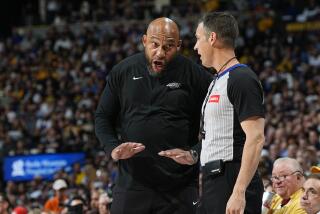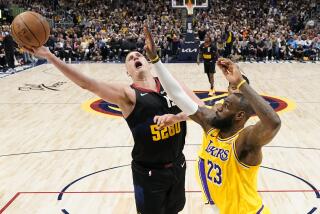COLLEGE BASKETBALL / GENE WOJCIECHOWSKI : Referees Couldn’t Ignore Webber’s Second Mistake
- Share via
Michigan forward Chris Webber arrived in Los Angeles late Tuesday night, the memory of his mistaken timeout call no doubt still painfully fresh in his mind.
Which brings up two questions of the utmost importance:
1. What really happened during the final 46 seconds of Monday night’s NCAA championship game between Michigan and North Carolina?
2. What might happen when Webber and Michigan Coach Steve Fisher, both in town for today’s John R. Wooden Award ceremonies at the Los Angeles Athletic Club, find noted Wolverine critic Bill Walton seated at the same dais?
First things first. Through videotape review, this is what apparently took place during the waning moments of Monday night’s game:
Time: 46 seconds.
Score: North Carolina 72, Michigan 69.
Situation: Wolverine forward Ray Jackson has made a jump shot from inches inside the three-point line. Michigan calls a timeout. During the huddle, the players are told they have no timeouts remaining.
Postgame explanation: “Apparently we didn’t get specific enough,” Fisher said.
Second-day theories: How specific do you have to be? “Yes, we have a timeout.” Or, “No, we don’t.” Simple.
A more plausible scenario is that Webber, exhausted by Michigan’s comeback effort, was too tired to pay attention. And please, no complaints that Superdome crowd noise could have affected the players’ hearing. At every timeout, the Michigan managers set up folding stools on the court, away from the fans and the bands. That’s where the team huddles took place.
Then . . .
Time: 11 seconds.
Score: North Carolina 73, Michigan 71.
Situation: Tar Heel forward Pat Sullivan has missed the second free throw of a one-and-one. Webber grabs the rebound, appears to look at the closest referee and half-motion for a timeout. He pulls his hand back and looks upcourt.
A split-second before passing the ball to teammate Jalen Rose, Webber sees North Carolina forward George Lynch make a move toward the Michigan guard. Rather than risk a turnover, Webber holds onto the ball and tries to dribble. In doing so, he appears guilty of traveling. The North Carolina bench goes nuts. The trailing official shakes his head, as if to say no violation occurred.
Webber dribbles furiously down the sideline, past the scorer’s table, past his coaches and then, with two Tar Heel defenders swiping at the ball, turns to an official and asks for a timeout. The Michigan bench, stunned by Webber’s actions, watches in horror as the official assesses a technical foul for excessive timeouts.
Postgame explanation: “Truthfully, I really don’t remember all the situation,” Webber said. “Obviously, I didn’t know (that Michigan had no timeouts) and that probably cost our team the game.”
Second-day theories: Let’s first start with an absolute. According to Booker Turner, supervisor of officials for the Pacific 10 Conference, Webber should have never been allowed to call the timeout in the first place.
Reason? Webber traveled shortly after the rebound of Sullivan’s missed free throw. North Carolina should have gotten the ball back.
“It was obvious it was a travel,” said Turner, who sat 16 rows up from the court and had a nice view of Webber’s awkward attempt to avoid a turnover. “Everybody felt that he traveled. I feel at that point, that the referees felt they didn’t want to decide the ballgame.”
Fair enough . . . if you’re from Michigan. As for the technical foul, the refs didn’t have a choice.
“You’ve got to do that,” Turner said. “What referees will do sometimes is, if they can, try to ignore calling the timeout. In this case, the coach didn’t want a timeout. The kid just forgot that he didn’t have a timeout.”
Turner said the officials couldn’t afford to give Webber the benefit of the doubt, not after the iffy non-traveling call moments earlier.
“There was too much at stake,” Turner said. “You’re talking about a two-point (North Carolina) advantage at the time. Ignore the timeout and you’re taking advantage of the other team, especially when you’re talking about the referee missing the travel. Now you’re talking about two for two. It’s like, ‘Who are we to decide a ballgame?’ But a rule is a rule.”
And what if the referee had simply told Webber to quit motioning for the timeout, that there were none left?
“You just can’t do that,” Turner said. “That’s not fair. When you’re playing for a national championship, that’s not your job to do that.”
The possible botched traveling call aside, there is still this matter of Webber’s thought process. Our theory? Brain lock. That, or he was just overwhelmed by the moment, or by the urging of his teammates. Lynch said he heard the Wolverine bench tell Webber to call a timeout. Wolverine James Voskuil said they were saying, “No timeout!”
Then . . .
Time: 11 seconds.
Score: North Carolina 75, Michigan 71.
Situation: Tar Heel guard Donald Williams has made two free throws, both made possible by the technical foul. North Carolina gets the ball, too. Three seconds later, Williams is intentionally fouled and makes two more free throws. Final score: 77-71.
Postgame explanation: “At that point in the game, you can’t point no fingers at no one,” said Michigan center Juwan Howard. “I kind of say to myself, ‘These are stupid questions.’ ”
Second-day theories: Howard, as did Fisher, was trying to protect Webber from the scrutiny. That’s what teammates and coaches do. No problem.
But Webber did make an error and, contrary to North Carolina Coach Dean Smith’s version, the game was not altogether decided. True, the Tar Heels could have chewed up the clock by fouling the Wolverines with no immediate penalty--North Carolina had three fouls to give. But also true is that Michigan could have easily worked free for a shot and tied or won the game.
*
Add Michigan and Webber: We could have done without the Wolverines’ us-against-the-media/Walton stuff, but say this for them: They played with skill and passion in the Final Four and remain the most interesting team in college basketball.
Of course, no one played harder or with more emotion than Webber. North Carolina’s Williams was the Final Four’s most valuable player--and deservedly so--but Webber was the best player on the floor.
And rather than retreat to the safety of the Michigan locker room after losing to the Tar Heels, Webber reluctantly reported to the postgame news conference and said what he could. It wasn’t much, but it was better than ducking the hard questions.
Equally impressive is Webber’s decision to attend today’s Wooden Award ceremonies. Chances are he won’t win. Indiana’s Calbert Cheaney is the probable winner, but yet, Webber made the effort.
As it turns out, Webber and Memphis State’s Anfernee Hardaway are the only finalists who actually made the trip. Cheaney, Kentucky’s Jamal Mashburn and Duke’s Bobby Hurley, all of them citing difficulties with their academic schedules, canceled their commitments. At last check, though, Hurley was still trying to gain permission from Duke officials to come to the presentation.
*
Last add Michigan: Before leaving for Los Angeles, Webber and the Michigan team returned to Ann Arbor for a welcome-home rally at Crisler Arena. The Wolverines were greeted by several thousand supporters and it was there that Webber addressed the affectionate crowd.
Webber never mentioned the play. He paid homage to the Wolverine seniors and then said, “We’ll be back next year.”
But afterward, while meeting with reporters, Webber said he hadn’t decided to return for his junior season or forgo his eligibility for the NBA draft. Instead, he said he wanted to take some time off, relax and reflect on a season that must have lasted forever. Especially those last 11 seconds.
More to Read
Go beyond the scoreboard
Get the latest on L.A.'s teams in the daily Sports Report newsletter.
You may occasionally receive promotional content from the Los Angeles Times.










